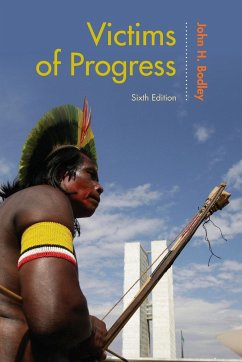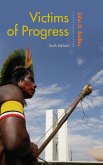John H. Bodley
Victims of Progress
John H. Bodley
Victims of Progress
- Broschiertes Buch
- Merkliste
- Auf die Merkliste
- Bewerten Bewerten
- Teilen
- Produkt teilen
- Produkterinnerung
- Produkterinnerung
This compelling account of how technology and development affect indigenous peoples throughout the world provides a provocative context in which students can think about civilization and its costs.
Andere Kunden interessierten sich auch für
![Victims of Progress Victims of Progress]() John H. BodleyVictims of Progress178,99 €
John H. BodleyVictims of Progress178,99 €![Chocolate, Politics and Peace-Building Chocolate, Politics and Peace-Building]() Gwen BurnyeatChocolate, Politics and Peace-Building85,99 €
Gwen BurnyeatChocolate, Politics and Peace-Building85,99 €![A Pragmatist's Progress? A Pragmatist's Progress?]() A Pragmatist's Progress?186,99 €
A Pragmatist's Progress?186,99 €![Sexual Violence and Effective Redress for Victims in Post-Conflict Situations Sexual Violence and Effective Redress for Victims in Post-Conflict Situations]() Jean De Dieu SikuliboSexual Violence and Effective Redress for Victims in Post-Conflict Situations119,99 €
Jean De Dieu SikuliboSexual Violence and Effective Redress for Victims in Post-Conflict Situations119,99 €![Property And Progress Property And Progress]() William Hurrell MallockProperty And Progress32,99 €
William Hurrell MallockProperty And Progress32,99 €![The Plight of Crime Victims in Modern Society The Plight of Crime Victims in Modern Society]() The Plight of Crime Victims in Modern Society110,99 €
The Plight of Crime Victims in Modern Society110,99 €![The Significance of Forgiveness in Reconciliation The Significance of Forgiveness in Reconciliation]() Thomas MechaThe Significance of Forgiveness in Reconciliation9,99 €
Thomas MechaThe Significance of Forgiveness in Reconciliation9,99 €-
-
-
This compelling account of how technology and development affect indigenous peoples throughout the world provides a provocative context in which students can think about civilization and its costs.
Hinweis: Dieser Artikel kann nur an eine deutsche Lieferadresse ausgeliefert werden.
Hinweis: Dieser Artikel kann nur an eine deutsche Lieferadresse ausgeliefert werden.
Produktdetails
- Produktdetails
- Verlag: Globe Pequot Publishing Group Inc/Bloomsbury
- Sixth Edition
- Seitenzahl: 410
- Erscheinungstermin: 14. August 2014
- Englisch
- Abmessung: 229mm x 152mm x 24mm
- Gewicht: 663g
- ISBN-13: 9781442226937
- ISBN-10: 1442226935
- Artikelnr.: 40578387
- Herstellerkennzeichnung
- Produktsicherheitsverantwortliche/r
- Europaallee 1
- 36244 Bad Hersfeld
- gpsr@libri.de
- Verlag: Globe Pequot Publishing Group Inc/Bloomsbury
- Sixth Edition
- Seitenzahl: 410
- Erscheinungstermin: 14. August 2014
- Englisch
- Abmessung: 229mm x 152mm x 24mm
- Gewicht: 663g
- ISBN-13: 9781442226937
- ISBN-10: 1442226935
- Artikelnr.: 40578387
- Herstellerkennzeichnung
- Produktsicherheitsverantwortliche/r
- Europaallee 1
- 36244 Bad Hersfeld
- gpsr@libri.de
By John H. Bodley
Preface and Acknowledgments 1: Introduction: Indigenous Peoples and Culture
Scale Culture Scale, Culture Process, and Indigenous Peoples Large-Scale
versus Small-Scale Society and Culture The Problem of Global-Scale Society
and Culture Social Scale and Social Power Negative Development: The Global
Pattern Policy Implications 2: Progress and Indigenous Peoples Progress:
The Commercial Explosion The Culture of Consumption Resource Appropriation
and Acculturation The Role of Ethnocentrism Civilization's Unwilling
Conscripts Cultural Pride versus Progress The Principle of Stabilization 3:
The Uncontrolled Frontier The Frontier Process Demographic Impact of the
Frontier 4: We Fought with Spears The Punitive Raid Wars of Extermination
5: The Extension of Government Control Aims and Philosophy of
Administration Tribal Peoples and National Unity The Transfer of
Sovereignty Treaty Making Bringing Government to the Tribes The Political
Integration Process Anthropology and Native Administration 6: Land Policies
The People-Land Relationship Land Policy Variables 7: Cultural Modification
Policies These Are the Things That Obstruct Progress Social Engineering:
How to Do It 8: Economic Globalization Forced Labor: Harnessing the
Heathens Learning the Dignity of Labor: Taxes and Discipline Creating
Progressive Consumers Promoting Technological Change Tourism and Indigenous
Peoples 9: The Price of Progress Progress and the Quality of Life Diseases
of Development Ecocide Deprivation and Discrimination 10: The Political
Struggle for Indigenous Self-Determination Who Are Indigenous Peoples? The
Initial Political Movements Creating Nunavut Guna Self-Determination: The
Comarca Gunayala The Political Struggle The Shuar Solution CONAIE: Uprising
Politics Reshaping Ecuador's Political Landscape The Dene Nation: Land, Not
Money Land Rights and the Outstation Movement in Australia Philippine
Tribals: No More Retreat Indigenous Peoples and the Arctic Council The
United Nations Declaration on the Rights of Indigenous Peoples Tebtebba: An
Indigenous Partnership on Climate Change and Forests 11: Petroleum, the
Commercial World, and Indigenous Peoples Petroleum: The Unsustainable
Foundation of the Commercial World The Gwich'in and Oil Development in the
Sacred Place Where Life Begins Petroleum Development and Indigenous Rights
in Ecuador First Nations Opposition to Canadian Tar Sand Development
Athabasca Chipewyan First Nation (ACFN) vs. Shell Oil Assigning
Responsibility for Tar Sand Development 12: Global Warming and Indigenous
Peoples The Indigenous Response to Global Warming Indigenous Peoples as
Climate Change Refugees Arctic Warming and Alaska Natives Global Warming
Perpetuators and Beneficiaries Assessing the Global Costs of Climate Change
& the Carbon Economy 13: Human Rights and the Politics of Ethnocide The
Realists: Humanitarian Imperialists and Scientists The World Bank:
Operational Manual 2005 and False Assurances The Idealist Preservationists
You Can't Leave Them Alone: The Realists Prevail Indigenous Peoples' Rights
Advocates Voluntary Isolation in the Twenty-First Century Indigenous
Peoples as Small Nations Conclusion Appendixes Bibliography Index About the
Author
Scale Culture Scale, Culture Process, and Indigenous Peoples Large-Scale
versus Small-Scale Society and Culture The Problem of Global-Scale Society
and Culture Social Scale and Social Power Negative Development: The Global
Pattern Policy Implications 2: Progress and Indigenous Peoples Progress:
The Commercial Explosion The Culture of Consumption Resource Appropriation
and Acculturation The Role of Ethnocentrism Civilization's Unwilling
Conscripts Cultural Pride versus Progress The Principle of Stabilization 3:
The Uncontrolled Frontier The Frontier Process Demographic Impact of the
Frontier 4: We Fought with Spears The Punitive Raid Wars of Extermination
5: The Extension of Government Control Aims and Philosophy of
Administration Tribal Peoples and National Unity The Transfer of
Sovereignty Treaty Making Bringing Government to the Tribes The Political
Integration Process Anthropology and Native Administration 6: Land Policies
The People-Land Relationship Land Policy Variables 7: Cultural Modification
Policies These Are the Things That Obstruct Progress Social Engineering:
How to Do It 8: Economic Globalization Forced Labor: Harnessing the
Heathens Learning the Dignity of Labor: Taxes and Discipline Creating
Progressive Consumers Promoting Technological Change Tourism and Indigenous
Peoples 9: The Price of Progress Progress and the Quality of Life Diseases
of Development Ecocide Deprivation and Discrimination 10: The Political
Struggle for Indigenous Self-Determination Who Are Indigenous Peoples? The
Initial Political Movements Creating Nunavut Guna Self-Determination: The
Comarca Gunayala The Political Struggle The Shuar Solution CONAIE: Uprising
Politics Reshaping Ecuador's Political Landscape The Dene Nation: Land, Not
Money Land Rights and the Outstation Movement in Australia Philippine
Tribals: No More Retreat Indigenous Peoples and the Arctic Council The
United Nations Declaration on the Rights of Indigenous Peoples Tebtebba: An
Indigenous Partnership on Climate Change and Forests 11: Petroleum, the
Commercial World, and Indigenous Peoples Petroleum: The Unsustainable
Foundation of the Commercial World The Gwich'in and Oil Development in the
Sacred Place Where Life Begins Petroleum Development and Indigenous Rights
in Ecuador First Nations Opposition to Canadian Tar Sand Development
Athabasca Chipewyan First Nation (ACFN) vs. Shell Oil Assigning
Responsibility for Tar Sand Development 12: Global Warming and Indigenous
Peoples The Indigenous Response to Global Warming Indigenous Peoples as
Climate Change Refugees Arctic Warming and Alaska Natives Global Warming
Perpetuators and Beneficiaries Assessing the Global Costs of Climate Change
& the Carbon Economy 13: Human Rights and the Politics of Ethnocide The
Realists: Humanitarian Imperialists and Scientists The World Bank:
Operational Manual 2005 and False Assurances The Idealist Preservationists
You Can't Leave Them Alone: The Realists Prevail Indigenous Peoples' Rights
Advocates Voluntary Isolation in the Twenty-First Century Indigenous
Peoples as Small Nations Conclusion Appendixes Bibliography Index About the
Author
Preface and Acknowledgments 1: Introduction: Indigenous Peoples and Culture
Scale Culture Scale, Culture Process, and Indigenous Peoples Large-Scale
versus Small-Scale Society and Culture The Problem of Global-Scale Society
and Culture Social Scale and Social Power Negative Development: The Global
Pattern Policy Implications 2: Progress and Indigenous Peoples Progress:
The Commercial Explosion The Culture of Consumption Resource Appropriation
and Acculturation The Role of Ethnocentrism Civilization's Unwilling
Conscripts Cultural Pride versus Progress The Principle of Stabilization 3:
The Uncontrolled Frontier The Frontier Process Demographic Impact of the
Frontier 4: We Fought with Spears The Punitive Raid Wars of Extermination
5: The Extension of Government Control Aims and Philosophy of
Administration Tribal Peoples and National Unity The Transfer of
Sovereignty Treaty Making Bringing Government to the Tribes The Political
Integration Process Anthropology and Native Administration 6: Land Policies
The People-Land Relationship Land Policy Variables 7: Cultural Modification
Policies These Are the Things That Obstruct Progress Social Engineering:
How to Do It 8: Economic Globalization Forced Labor: Harnessing the
Heathens Learning the Dignity of Labor: Taxes and Discipline Creating
Progressive Consumers Promoting Technological Change Tourism and Indigenous
Peoples 9: The Price of Progress Progress and the Quality of Life Diseases
of Development Ecocide Deprivation and Discrimination 10: The Political
Struggle for Indigenous Self-Determination Who Are Indigenous Peoples? The
Initial Political Movements Creating Nunavut Guna Self-Determination: The
Comarca Gunayala The Political Struggle The Shuar Solution CONAIE: Uprising
Politics Reshaping Ecuador's Political Landscape The Dene Nation: Land, Not
Money Land Rights and the Outstation Movement in Australia Philippine
Tribals: No More Retreat Indigenous Peoples and the Arctic Council The
United Nations Declaration on the Rights of Indigenous Peoples Tebtebba: An
Indigenous Partnership on Climate Change and Forests 11: Petroleum, the
Commercial World, and Indigenous Peoples Petroleum: The Unsustainable
Foundation of the Commercial World The Gwich'in and Oil Development in the
Sacred Place Where Life Begins Petroleum Development and Indigenous Rights
in Ecuador First Nations Opposition to Canadian Tar Sand Development
Athabasca Chipewyan First Nation (ACFN) vs. Shell Oil Assigning
Responsibility for Tar Sand Development 12: Global Warming and Indigenous
Peoples The Indigenous Response to Global Warming Indigenous Peoples as
Climate Change Refugees Arctic Warming and Alaska Natives Global Warming
Perpetuators and Beneficiaries Assessing the Global Costs of Climate Change
& the Carbon Economy 13: Human Rights and the Politics of Ethnocide The
Realists: Humanitarian Imperialists and Scientists The World Bank:
Operational Manual 2005 and False Assurances The Idealist Preservationists
You Can't Leave Them Alone: The Realists Prevail Indigenous Peoples' Rights
Advocates Voluntary Isolation in the Twenty-First Century Indigenous
Peoples as Small Nations Conclusion Appendixes Bibliography Index About the
Author
Scale Culture Scale, Culture Process, and Indigenous Peoples Large-Scale
versus Small-Scale Society and Culture The Problem of Global-Scale Society
and Culture Social Scale and Social Power Negative Development: The Global
Pattern Policy Implications 2: Progress and Indigenous Peoples Progress:
The Commercial Explosion The Culture of Consumption Resource Appropriation
and Acculturation The Role of Ethnocentrism Civilization's Unwilling
Conscripts Cultural Pride versus Progress The Principle of Stabilization 3:
The Uncontrolled Frontier The Frontier Process Demographic Impact of the
Frontier 4: We Fought with Spears The Punitive Raid Wars of Extermination
5: The Extension of Government Control Aims and Philosophy of
Administration Tribal Peoples and National Unity The Transfer of
Sovereignty Treaty Making Bringing Government to the Tribes The Political
Integration Process Anthropology and Native Administration 6: Land Policies
The People-Land Relationship Land Policy Variables 7: Cultural Modification
Policies These Are the Things That Obstruct Progress Social Engineering:
How to Do It 8: Economic Globalization Forced Labor: Harnessing the
Heathens Learning the Dignity of Labor: Taxes and Discipline Creating
Progressive Consumers Promoting Technological Change Tourism and Indigenous
Peoples 9: The Price of Progress Progress and the Quality of Life Diseases
of Development Ecocide Deprivation and Discrimination 10: The Political
Struggle for Indigenous Self-Determination Who Are Indigenous Peoples? The
Initial Political Movements Creating Nunavut Guna Self-Determination: The
Comarca Gunayala The Political Struggle The Shuar Solution CONAIE: Uprising
Politics Reshaping Ecuador's Political Landscape The Dene Nation: Land, Not
Money Land Rights and the Outstation Movement in Australia Philippine
Tribals: No More Retreat Indigenous Peoples and the Arctic Council The
United Nations Declaration on the Rights of Indigenous Peoples Tebtebba: An
Indigenous Partnership on Climate Change and Forests 11: Petroleum, the
Commercial World, and Indigenous Peoples Petroleum: The Unsustainable
Foundation of the Commercial World The Gwich'in and Oil Development in the
Sacred Place Where Life Begins Petroleum Development and Indigenous Rights
in Ecuador First Nations Opposition to Canadian Tar Sand Development
Athabasca Chipewyan First Nation (ACFN) vs. Shell Oil Assigning
Responsibility for Tar Sand Development 12: Global Warming and Indigenous
Peoples The Indigenous Response to Global Warming Indigenous Peoples as
Climate Change Refugees Arctic Warming and Alaska Natives Global Warming
Perpetuators and Beneficiaries Assessing the Global Costs of Climate Change
& the Carbon Economy 13: Human Rights and the Politics of Ethnocide The
Realists: Humanitarian Imperialists and Scientists The World Bank:
Operational Manual 2005 and False Assurances The Idealist Preservationists
You Can't Leave Them Alone: The Realists Prevail Indigenous Peoples' Rights
Advocates Voluntary Isolation in the Twenty-First Century Indigenous
Peoples as Small Nations Conclusion Appendixes Bibliography Index About the
Author








